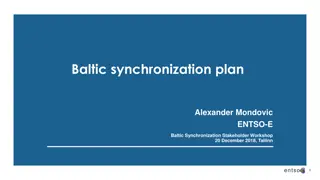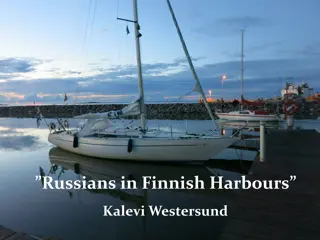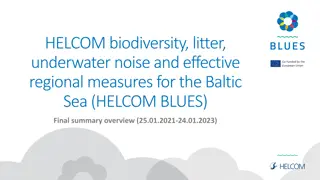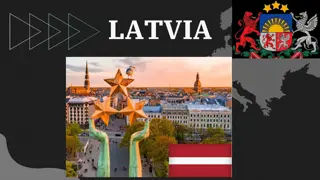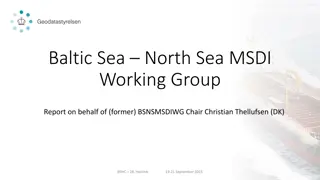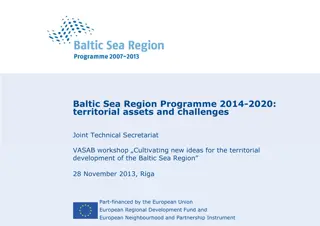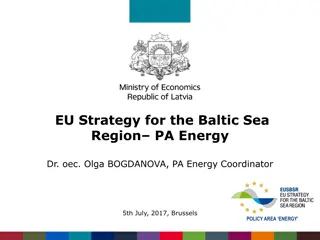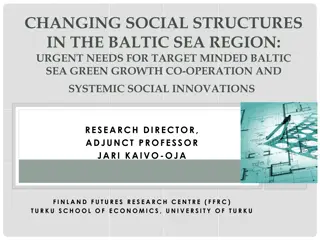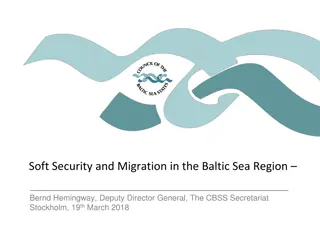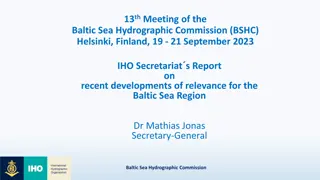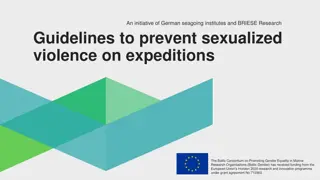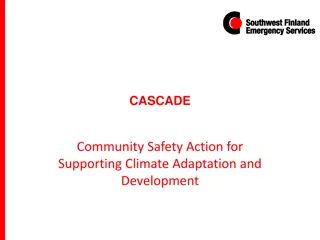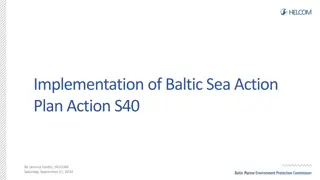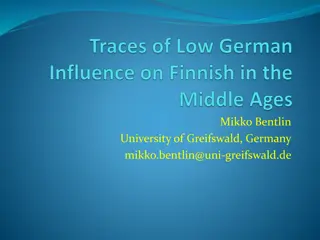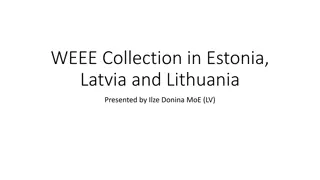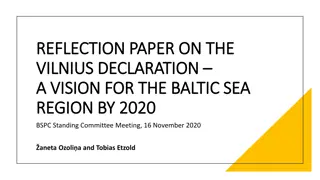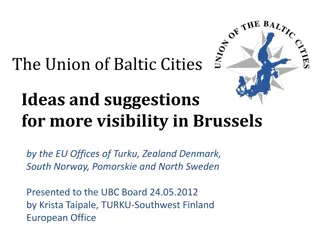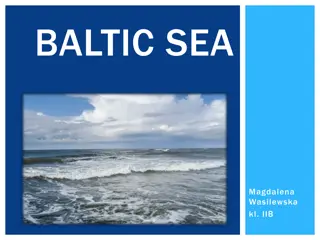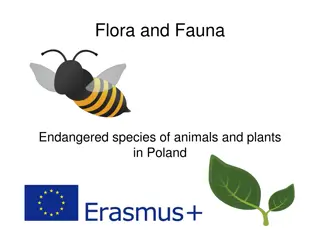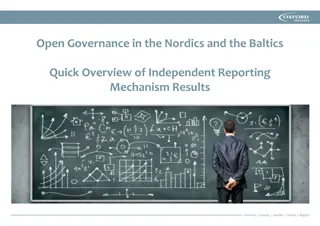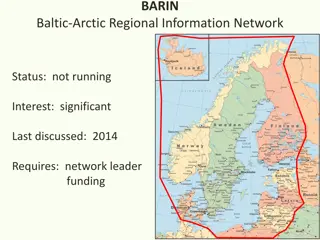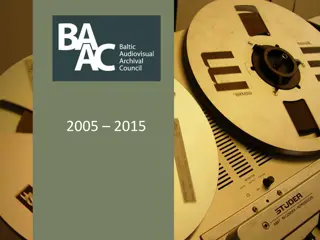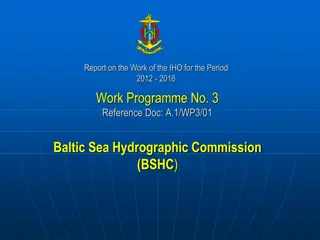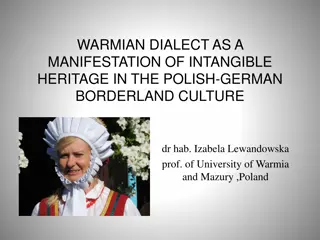Understanding Voluntary Sustainability Schemes: ISCC and REDcert
Explore the principles and methods of Voluntary Sustainability Schemes (VS) such as ISCC and REDcert, focusing on mass balancing to implement and document sustainability measures. Learn how these methods can support sustainability claims and bio-content initiatives. Gain insights from Maja Henriksen
3 views • 17 slides
Rowing Committee Selection Criteria and Activities for 2024 Season
The Rowing Committee's selection criteria and activities for the 2024 season are outlined, focusing on the process for selecting teams for various representative tasks sanctioned by the Danish Rowing Association (DFfR). The criteria serve as a starting point, with the committee having the discretion
1 views • 21 slides
Automatic Recognition of Higher Education Qualifications Treaty Summary
Importance of automatic recognition of qualifications in higher education has been emphasized, leading to initiatives like the Treaty on Automatic Recognition of Higher Education Qualifications by Baltic and Benelux states. This treaty aims to enhance mutual trust, transparent recognition, and contr
1 views • 8 slides
Baltic Synchronization Plan and Frequency Stability Study
The Baltic Synchronization Plan explores the outcomes of the Frequency Stability Study, focusing on the effects on synchronous areas and the ENTSO-E procedure. It delves into scenarios involving existing and new HVDC links between countries like Poland and Lithuania, emphasizing the importance of th
0 views • 19 slides
Boating Information in Finland, Russia, and Estonia
Discover valuable insights into boating activities and facilities in Finland, Russia, and Estonia. Learn about the extensive number of lakes, islands, and harbors in Finland, the preferences of Russians for Finnish harbors, and the pros and cons of boating in Estonia compared to Finland. Find out ab
2 views • 11 slides
Understanding Policy Change in the Baltic Sea Region
Financial and fiscal bureaucracy in the Baltic Sea Region is examined, focusing on micro-level practices and routines within public sector organizations. Case studies from Estonia, Latvia, Sweden, Norway, Lithuania, and Southeast Asia are analyzed to understand the implementation of financial and fi
4 views • 7 slides
Supporting Marine Environment in the Baltic Sea: HELCOM.BLUES Project Overview
The HELCOM.BLUES project focuses on biodiversity, litter, underwater noise, and regional measures for the Baltic Sea. It aims to enhance regional capacity for developing effective measures to maintain a healthy marine environment. The project involves a consortium of 14 partners and over 7 subcontra
0 views • 22 slides
Discover Latvia: A Brief Overview of Culture, Nature, and Traditions
Latvia, one of the Baltic states, is bordered by Estonia, Lithuania, Russia, and Belarus. The country has a rich cultural heritage, with a population of about 1.9 million and the official language being Latvian. Explore its diverse cities like Riga, its temperate seasonal climate, education system,
0 views • 13 slides
Baltic Sea North Sea MSDI Working Group Report
The Baltic Sea North Sea MSDI Working Group report presents the group's history, current dormant state, and plans for the future. Following low activity in recent years, discussions among members concluded that the group may no longer add value to international work on MSDI. The group is set to rema
0 views • 6 slides
Territorial Development in the Baltic Sea Region Programme 2014-2020
The Baltic Sea Region Programme 2014-2020 focuses on sustainable regional development through transnational cooperation projects, addressing territorial challenges, and fostering place-based growth. It covers 11 participating countries and aligns with the EU Strategy for the Baltic Sea Region, provi
1 views • 11 slides
EU Strategy for the Baltic Sea Region PA Energy Overview
The EU Strategy for the Baltic Sea Region focuses on enhancing regional energy cooperation and optimizing formats in Energy. Key elements include the BEMIP Joint Action Plan, promoting sustainable energy development, and enhancing energy efficiency. The Policy Area Energy reform aims to integrate th
0 views • 19 slides
Transforming Social and Economic Structures in the Baltic Sea Region
Urgent cooperation is needed for Baltic Sea green growth initiatives and innovative research to address changing social and economic structures. Key themes include green growth, global climate change, economic growth, and innovation platforms. The shift towards the sixth wave and green growth presen
0 views • 36 slides
Soft Security and Migration Management in the Baltic Sea Region
The conference in Helsinki addressed soft security and migration challenges in the Baltic Sea Region, emphasizing the integration of migrants and societal security paradigms. It highlighted the need for a consensual approach, dialogue, and promotion of social inclusion. The current migration system
0 views • 12 slides
Recent Developments in Marine Geospatial Information Management
The Baltic Sea Hydrographic Commission and related activities highlight significant developments in marine geospatial information management, including upcoming council meetings, GEBCO initiatives, and UN-GGIM endorsements of integrated marine geospatial frameworks. These efforts aim to enhance data
4 views • 8 slides
Guidelines for Preventing Sexualized Violence on Research Expeditions
Guidelines from the Baltic Gender initiative focus on creating a safe working environment at sea to prevent sexualized violence. The initiative defines sexualized violence, outlines prevention methods, and advises on how to respond if incidents occur. It emphasizes awareness, consent, speaking up, s
0 views • 8 slides
CASCADE Project: Climate Adaptation & Development Support
CASCADE is a two-year project funded by DG ECHO aimed at developing a macro-regional approach for climate change risks in the Baltic Sea Region. The project focuses on risk assessment, treatment, and capacity building to enhance urban risk management related to climate change. It involves civil prot
0 views • 8 slides
Implementation of Baltic Sea Action Plan Action S40 Overview
The Baltic Sea Action Plan aims for a healthy Baltic Sea environment by implementing 199 actions and measures by 2030. Action S40 focuses on identifying fish species needing better data by 2024 and implementing measures for good environmental status. Programs are established to record and report dat
0 views • 12 slides
Influence of Low German on Swedish Development in the Baltic Region
The history of Finland in the 12th century, the incorporation into the Swedish realm, Christianization, and economic shifts due to Hanseatic League dominance are depicted. The chronology of Low German, its separate language development within the Germanic branch, and its decline with the Reformation
0 views • 12 slides
Overview of WEEE Collection in Baltic States
This presentation explores the WEEE (Waste Electrical and Electronic Equipment) collection practices in Estonia, Latvia, and Lithuania. It covers the targets set by the WEEE directive 2012/19/EU, the setup of collection systems, and the results achieved. The content delves into the minimum collectio
0 views • 19 slides
Reflection on Vilnius Declaration: A Vision for the Baltic Sea Region by 2020
Analysis of the Vilnius Declaration highlights progress in institutional strengthening, economic stability, energy sector advancements, and the importance of people-to-people contacts. However, challenges remain in areas like public-private partnerships, maritime policy coherence, socio-economic dis
0 views • 11 slides
Enhancing Visibility of the Union of Baltic Cities in Brussels and Key Policy Focus Areas
Ideas and suggestions were presented to the UBC Board to increase visibility in Brussels by the EU offices of Turku, Zealand Denmark, South Norway, Pomorskie, and North Sweden. The focus includes positioning UBC as a relevant actor to the EU, branding through lobbying and clear communication, and su
0 views • 10 slides
Explore the Wonders of the Baltic Sea
The Baltic Sea, located in Northern Europe, is a unique body of water known for its brackish nature and rich biodiversity. Stretching across various regions and basins, the sea is home to numerous islands and archipelagos, each adding to its charm and beauty. Discover the geophysical data, coastal t
0 views • 11 slides
Endangered Flora and Fauna in Poland
Bees in Poland are facing threats from pesticides, lynx populations are at risk due to human activities and parasites, European bison are found in mixed forests, grey seals in the Baltic Sea are protected, Alpine edelweiss is rare in Poland, and the common yew is a slow-growing tree of value. These
0 views • 10 slides
Overview of Open Governance in the Nordic and Baltic Regions
Explore the status of Open Government Partnership processes in the Nordic and Baltic countries, including challenges, partnerships, and responsible entities. Gain insights from Independent Reporting Mechanism results and national progress reports. Learn about the latest assessments, consultation met
0 views • 16 slides
BARIN Baltic-Arctic Regional Information Network Overview
BARIN, a network focused on environmental monitoring and climate change research in the Baltic-Arctic region, is currently not running but has a significant interest. Established connections with over 50 research institutes and universities. Key areas of interest include carbon flux monitoring, clim
0 views • 7 slides
History and Formation of Baltic Audiovisual Archival Council (BAAC)
The Baltic Audiovisual Archival Council (BAAC) is an independent non-profit organization established to foster cooperation among archives, broadcasting, TV archives, libraries, and museums holding audiovisual materials related to the Baltic States, Scandinavian countries, and the Baltic diaspora. Th
0 views • 13 slides
Report on the Work of the IHO for the Period 2012-2016 by the Baltic Sea Hydrographic Commission (BSHC)
The report highlights the achievements of the Baltic Sea Hydrographic Commission (BSHC) during 2012-2016, including joint projects, database provisions, harmonized chart datum, and collaboration efforts. It also addresses the challenges faced by Lithuania as an Associate Member and emphasizes the pr
0 views • 6 slides
Preservation of Warmian Dialect as Intangible Heritage in Polish-German Borderland
The Warmian dialect represents a unique blend of Old-Baltic, German, and Polish influences in the Polish-German borderland. This manifestation of intangible heritage has been recognized by UNESCO, emphasizing its cultural significance through oral traditions, social practices, and linguistic evoluti
0 views • 10 slides



